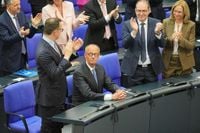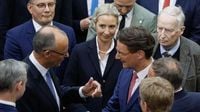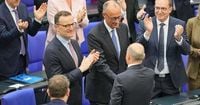Germany witnessed a historic political event on May 6, 2025, as Friedrich Merz, leader of the Christian Democratic Union (CDU), was elected as the new Chancellor after a tumultuous election process. This marked a significant moment in German politics, as Merz became the first designated Chancellor candidate in the history of the Federal Republic to fail in the first round of voting but ultimately succeed in a subsequent ballot.
Ten weeks after the Bundestag elections in February, the new federal government formed by the Union and the Social Democratic Party (SPD) was set to take office. The day began with high expectations, but Merz's initial attempt to secure the necessary majority in the Bundestag fell short. He needed at least 316 votes to be elected, but he received only 310, with 307 votes against and three abstentions, resulting in a failure to achieve the required majority.
After this unexpected setback, the Bundestag President, Julia Klöckner, announced the need for a second round of voting, which was scheduled for later that afternoon. This move required a two-thirds majority to expedite the process, and all factions, including the opposition parties, agreed to proceed with the second vote. The urgency was palpable, as both the CDU and SPD leaders emphasized the necessity of establishing a stable government for the country.
As the second round of voting commenced at 15:54, Merz's supporters remained optimistic. Jens Spahn, the CDU faction leader, expressed confidence that Merz would secure the necessary votes this time. The political atmosphere was charged, with various factions engaging in discussions about the implications of the failed first round and the need for a government capable of addressing pressing national issues.
At 16:21, Klöckner announced the results of the second vote: Merz had garnered 325 votes, exceeding the required majority by nine votes. With this victory, he was officially elected as the tenth Chancellor of Germany. Merz accepted the election with gratitude, stating, "I thank you for your trust, and I accept the election," as he prepared to take his oath of office.
Following his election, Merz was scheduled to receive his certificate of appointment from Federal President Frank-Walter Steinmeier at Schloss Bellevue. Arriving at the presidential palace with a delay of over six hours due to the earlier voting failure, Merz was greeted with applause from fellow politicians and dignitaries. Steinmeier lightened the mood by commenting on the delay with a smile, saying, "With a slight delay." Shortly after, Ukrainian President Volodymyr Zelenskyy congratulated Merz, expressing hope for stronger leadership from Germany in Europe and the transatlantic alliance.
Despite the celebration, the events leading to Merz's election raised concerns among political analysts and economic leaders. The German Chamber of Industry and Commerce (DIHK) described the initial failure as a "devastating signal" for the economy, emphasizing the urgent need for political stability. DIHK President Peter Adrian lamented, "Instead of clarity, uncertainty prevails. The urgently needed stability continues to be delayed," highlighting the potential consequences for businesses and employment.
Merz's election was not without controversy. The Green Party, while agreeing to the second vote, made it clear that they would not support Merz's candidacy, emphasizing that the coalition must demonstrate its capability to govern without relying on opposition support. Green leader Katharina Dröge stated, "We, the Greens, will not vote for Friedrich Merz," indicating a reluctance to endorse a leader they believe is not aligned with their values.
Furthermore, the Alternative for Germany (AfD) party, which had previously expressed skepticism about Merz, also welcomed the outcome of the first vote, calling it a sign of weakness within the coalition. AfD co-faction leader Tino Chrupalla ruled out any support for Merz from their members, asserting, "Merz must organize his majorities himself," further complicating the political landscape.
As the day progressed, the political discourse continued to evolve. Notably, former Chancellor Angela Merkel was absent from the second voting session, citing scheduling conflicts. Her absence was felt, as she had previously been a significant figure in German politics and a rival to Merz.
In the aftermath of the election, attention turned to the formation of the new cabinet. Merz's government is expected to be larger, older, and more male-dominated than the previous coalition, with an average age rising from 50.4 to 53.1 years. The new cabinet will feature 18 members, reflecting the establishment of a Digital Ministry, a move aimed at addressing modern challenges.
As the new Chancellor prepares to take office, he faces a range of challenges, including economic stability, migration policy, and international relations. The political landscape in Germany remains dynamic, with ongoing discussions about the coalition's ability to govern effectively.
In conclusion, Friedrich Merz's election as Chancellor marks a pivotal moment in German politics, characterized by unexpected challenges and a renewed focus on political stability. As the new government takes shape, the eyes of the nation and the world will be on Merz as he navigates the complexities of leadership in a changing political environment.






